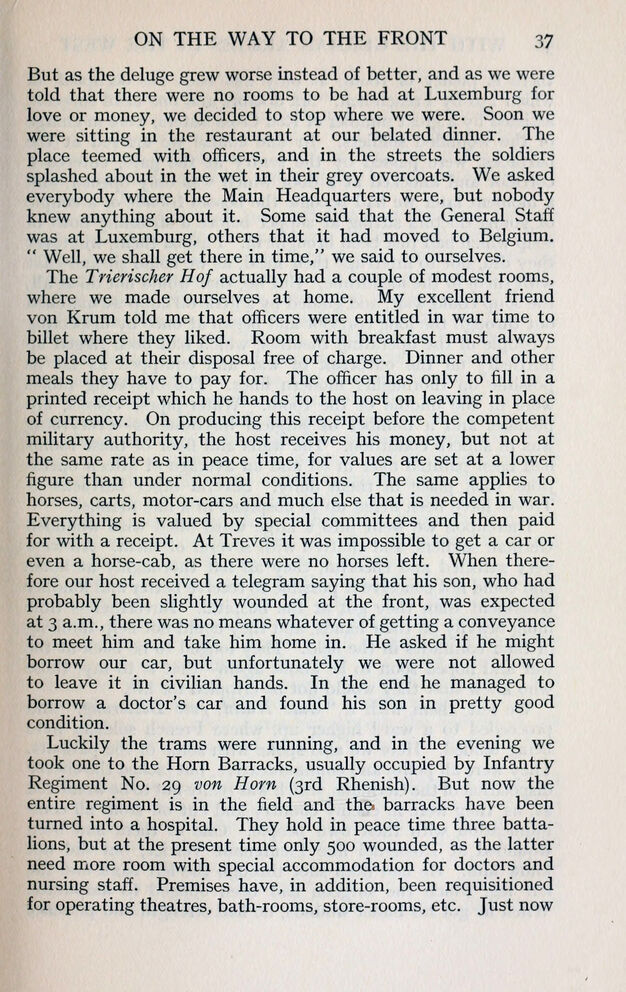
Full resolution (JPEG) - On this page / på denna sida - I. On the Way to the Front

<< prev. page << föreg. sida << >> nästa sida >> next page >>
Below is the raw OCR text
from the above scanned image.
Do you see an error? Proofread the page now!
Här nedan syns maskintolkade texten från faksimilbilden ovan.
Ser du något fel? Korrekturläs sidan nu!
This page has never been proofread. / Denna sida har aldrig korrekturlästs.
ON THE WAY TO THE FRONT 37
But as the deluge grew worse instead of better, and as we were
told that there were no rooms to be had at Luxemburg for
love or money, we decided to stop where we were. Soon we
were sitting in the restaurant at our belated dinner. The
place teemed with officers, and in the streets the soldiers
splashed about in the wet in their grey overcoats. We asked
everybody where the Main Headquarters were, but nobody
knew anything about it. Some said that the General Staff
was at Luxemburg, others that it had moved to Belgium.
" Well, we shall get there in time," we said to ourselves.
The Trierischer Hof actually had a couple of modest rooms,
where we made ourselves at home. My excellent friend
von Krum told me that officers were entitled in war time to
billet where they liked. Room with breakfast must always
be placed at their disposal free of charge. Dinner and other
meals they have to pay for. The officer has only to fill in a
printed receipt which he hands to the host on leaving in place
of currency. On producing this receipt before the competent
military authority, the host receives his money, but not at
the same rate as in peace time, for values are set at a lower
figure than under normal conditions. The same applies to
horses, carts, motor-cars and much else that is needed in war.
Everything is valued by special committees and then paid
for with a receipt. At Treves it was impossible to get a car or
even a horse-cab, as there were no horses left. When there-
fore our host received a telegram saying that his son, who had
probably been slightly wounded at the front, was expected
at 3 a.m., there was no means whatever of getting a conveyance
to meet him and take him home in. He asked if he might
borrow our car, but unfortunately we were not allowed
to leave it in civilian hands. In the end he managed to
borrow a doctor’s car and found his son in pretty good
condition.
Luckily the trams were running, and in the evening we
took one to the Horn Barracks, usually occupied by Infantry
Regiment No. 29 von Horn (3rd Rhenish). But now the
entire regiment is in the field and the* barracks have been
turned into a hospital. They hold in peace time three batta-
lions, but at the present time only 500 wounded, as the latter
need more room with special accommodation for doctors and
nursing staff. Premises have, in addition, been requisitioned
for operating theatres, bath-rooms, store-rooms, etc. Just now
<< prev. page << föreg. sida << >> nästa sida >> next page >>